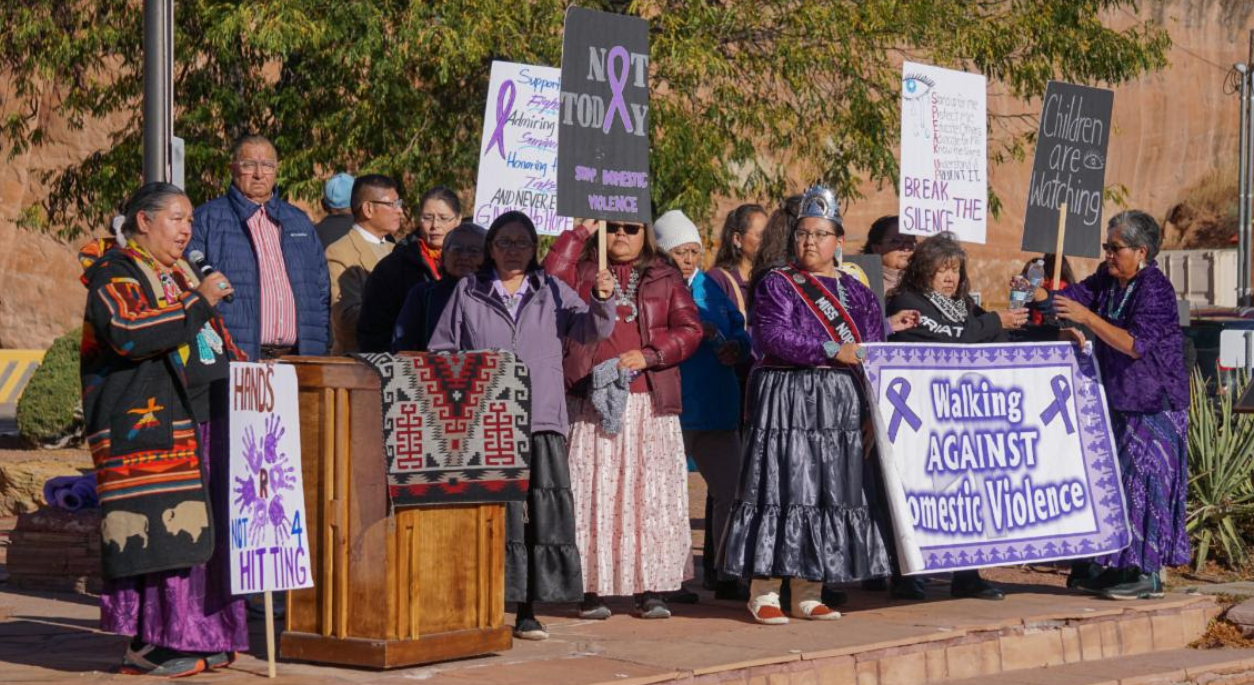
- Details
- By Native News Online Staff
The 25th Navajo Nation Council commenced the 2024 Fall Session with two impactful awareness walks, demonstrating its strong commitment to addressing pressing challenges in the Navajo community—domestic violence and disability employment. These events highlighted the Council's dedication to advocacy and its ongoing efforts to promote safety, dignity, and inclusivity throughout the Navajo Nation.
The Domestic Violence Awareness Walk, now in its ninth year, was spearheaded by Council Delegate Amber Kanazbah Crotty, Chair of the Missing and Murdered Diné Relative (MMDR) Task Force. The walk aimed to raise awareness of domestic violence across the Nation and featured participation from Navajo Nation Vice President Richelle Montoya, Director of the Navajo Nation Division for Children and Family Services Thomas Cody, and MMDR task force members. The march began at the Navajo Nation Museum and concluded at the Council Chambers, symbolizing a unified stance against domestic violence.
“Domestic violence continues to affect our communities, our families, and our children at alarming rates,” said Chair Crotty. “This walk is not just symbolic; it’s a promise to the people we serve—a promise to fight for their safety, dignity, and well-being. We walk not only to raise awareness but to demand action, support, and change.”
At the same time, the Council hosted an Awareness Walk for National Disability Employment Awareness Month (NDEAM), emphasizing the need for inclusive employment and service accessibility for people with disabilities. The event featured Navajo Nation Speaker Crystalyne Curley, Council Delegate Dr. Andy Nez, and representatives from the Native American Disability Law Center, the Navajo Nation Advisory Council on Disability, and the Office of Special Education and Rehabilitation Services (NNOSERS).
Speaker Curley stressed the importance of recognizing the person beyond the disability and ensuring equal opportunity for all. "We must look beyond the disability and see the person," she said. "Everyone deserves dignity and equal opportunity." Delegate Dr. Andy Nez echoed the need for accessible services that meet the diverse needs of Diné citizens, noting that inclusive support strengthens the entire community.
These awareness events are part of the Council's broader initiatives to address domestic violence and enhance inclusivity for individuals with disabilities. Navajo Nation leaders reaffirmed their commitment to improving safety, implementing preventive measures, and advancing the Americans with Disabilities Act (ADA) across the reservation. Additional NDEAM activities, including walks in Tuba City, Crownpoint, and Shiprock, will culminate in a disability conference on October 30, focusing on legal rights and employment resources.
The dual advocacy efforts reflect the Council's determination to eradicate domestic violence and foster an inclusive environment where all Navajo citizens can thrive. Speaker Curley, Chair Crotty, and Vice President Montoya emphasized that these initiatives go beyond symbolic gestures, representing meaningful steps toward a safer, stronger, and more equitable Navajo Nation.
More Stories Like This
End of Enhanced Obamacare Subsidies Puts Tribal Health Lifeline at RiskSanta Ynez Tribal Health Clinic to Host Free Pediatric Dental Clinic
Rez Vet Earns Global Recognition for Serving Navajo Nation's Animals
Chickasaw Nation Governor Bill Anoatubby leads groundbreaking for pediatric clinic
Cherokee Nation Eyes $4 Million Transitional Housing Program


